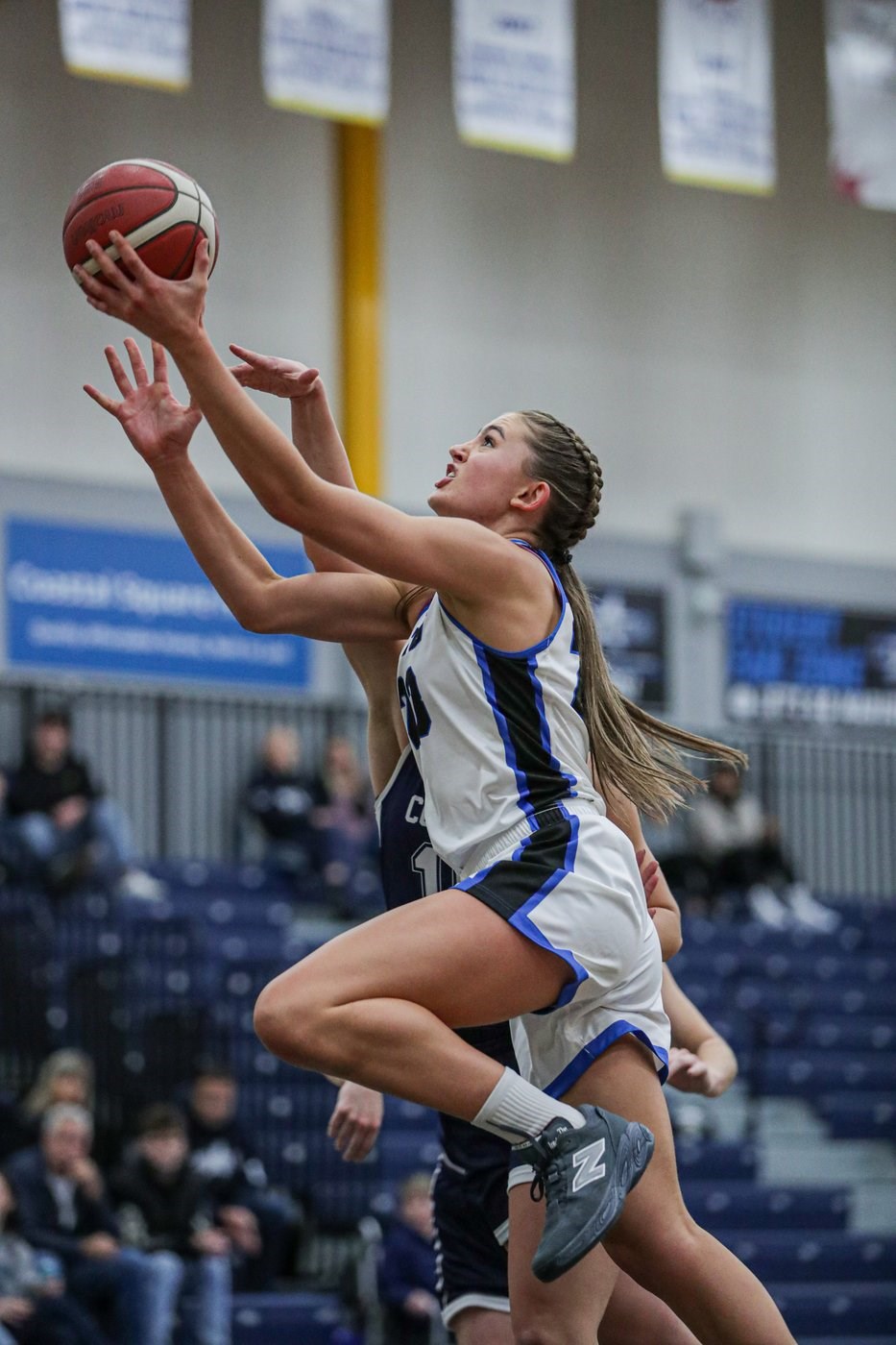Basketball was Harriette Mackenzie's safe space growing up.
She knew from an early age that she was different, and the court was where she could escape.
“I didn’t have a lot of times when I didn’t feel very burdened or sad. And I remember basketball was just a place that was an outlet," Mackenzie told The Canadian Press. "It was nice to be good at something, I guess.”
Now a star player at Vancouver Island University in Nanaimo, Mackenzie is speaking up about the treatment she says she's received as a transgender athlete, hoping her voice and experience can create a safe space for others.
The six-foot-two, 21-year-old forward took to social media earlier this week to detail what happened during and after a pair of home games against Columbia Bible College.
"I'm proud of my story. And I want to make something very clear — queer, trans and nonbinary people belong in sport," she said in the video. "And there is zero space in this league for hate, violence and bigotry."
Mackenzie said the visiting team's coach, Taylor Claggett, went on a "tirade" after losing on Friday, yelling at a VIU staff member about how Mackenzie shouldn't be allowed to play against women. A social media account linked to Claggett also posted anti-trans messages after the game.
The two sides played again on Saturday and Mackenzie said she was physically targeted by her opponents. She shared a video from the game where, away from the ball, a CBC player tosses Mackenzie to the ground.
Columbia Bible College, an evangelical Mennonite bible college located in Abbotsford, sa国际传媒, issued a statement late Thursday saying it feels Mackenzie's video "does not accurately represent all the events that took place."
"Taylor Claggett was speaking out for the safety of her players like any good coach would do," the statement said. "We stand in support of Taylor Claggett, and all our coaches, in expressing their legitimate concerns for the safety of our student-athletes."
Mackenzie said the treatment she experienced last weekend is nothing new and that she's been outed and attacked by players, coaches and fans across her basketball career.
Critics have always been quick to attribute her success to being transgender, said Mackenzie, whose parents both played college basketball.
“People see how high I can jump and they’ll say that’s why," she said. "No, it’s because I’ve had to work twice as hard as any of my competitors to be able to do that.”
Mackenzie — who started transitioning when she was in kindergarten or Grade 1 — said people don't understand the obstacles she faces as a trans woman in sports.
“I believe all trans people should be included in sport. But it’s especially infuriating to me because I’m playing — and being forced to play — at a major biological disadvantage," she said. "I never went through a male puberty. I only went through a female puberty. And I don’t have ovaries, I don’t have testicles, so I have zero way of making any testosterone.”
The Pacific Western Athletic Association, VIU's conference, allows transgender athletes to play as long as they comply with the Canadian Anti-Doping Program, which restricts the hormone suppressants and replacements an athlete is allowed to take.
That means Mackenzie has a much lower testosterone level than her teammates and competitors.
“In terms of recovery, muscle mass, I’m at a competitive disadvantage," she said.
Last season, Mackenzie played at Mount Royal University in Calgary — an experience that nearly snuffed out her love of basketball.
Mackenzie said a teammate made transphobic comments behind her back and, when she went to her coach for support, she didn't receive any.
Mount Royal said in a statement that the school is grateful to Mackenzie for her contributions and wishes her all the best.
"MRU does not tolerate harassment and discrimination of athletes in any way and continues to support all our student-athletes as part of the University’s commitment to equity, diversity, and inclusion," the statement said.
The situation grew worse in February when Alberta Premier Danielle Smith unveiled plans for new legislation — and this week her government tabled a bill — that would, in part, ban trans women from competing in women's sports leagues.
“That prompted people to be even more bold in terms of being hateful online, outing me online," said Mackenzie, whose name appears on at least one website dedicated to outing trans women in sports.
As the political rhetoric and hate swirled, Mackenzie grew increasingly concerned about her safety.
“Looking back on it now, I was in just pure fight or flight," she said. "I was so shut down. I couldn’t sleep, I couldn’t really eat. I was just trying to get by and survive, but also trying to keep up a front of I’m OK.”
On the court, Mackenzie excelled. She led Mount Royal in both scoring and rebounding, averaging 12.7 points and 10.7 rebounds per game across the season.
She did not start a single game and was not recognized at the end-of-year awards ceremony.
“At the end of last year, I wasn’t sure I wanted to play basketball anymore," Mackenzie said. "Even though I was the best performer on my team, it felt like I’d gotten worse because I had zero confidence.”
Mackenzie returned home to Comox and eventually decided to go back to VIU, where she won a national championship in 2023. She'd kept in touch with her former coach, Tony Bryce, and felt like her safety would be a priority if she played for him again.
The change has been a relief, Mackenzie said.
“The difference just in terms of fun and team chemistry and stuff has been really nice," she said. "This is how I remember basketball feeling and how I remember enjoying it."
This report by The Canadian Press was first published Nov. 1, 2024.
Note to readers: This is a corrected story. A previous version misidentified Columbia Bible College as Canadian Bible College.



